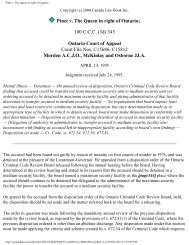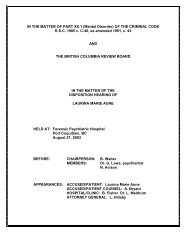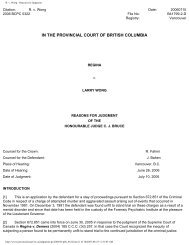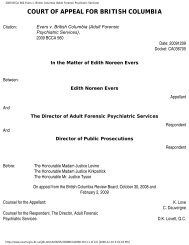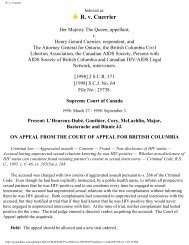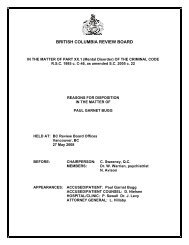R. v. CONWAY - British Columbia Review Board
R. v. CONWAY - British Columbia Review Board
R. v. CONWAY - British Columbia Review Board
Create successful ePaper yourself
Turn your PDF publications into a flip-book with our unique Google optimized e-Paper software.
[64] Gonthier J., writing for a unanimous Court, expressly rejected the 1996 ratio in<br />
Cooper, particularly insofar as it distinguished between limited and general questions of law and<br />
insofar as it suggested that an adjudicative function was a prerequisite for a tribunal’s constitutional<br />
jurisdiction. He also expressly rejected Lamer C.J.’s contention that the Cuddy Chicks trilogy was<br />
inconsistent with the separation of powers and Parliamentary democracy.<br />
[65] Instead, Gonthier J. affirmed and synthesized the main principles emerging from<br />
the trilogy. The first was the principle of constitutional supremacy, which provides that any law<br />
that is inconsistent with the Constitution is, to the extent of the inconsistency, of no force and effect.<br />
No government actor can apply an unconstitutional law, he observed, and, subject to an express<br />
contrary intention, a government agency given statutory authority to consider questions of law is<br />
presumed to have the jurisdiction to assess related constitutional questions.<br />
[66] As a further corollary, Gonthier J. echoed the views expressed over the years by<br />
McLachlin J., Major J., La Forest J., and McIntyre J. confirming that “Canadians should be entitled<br />
to assert the rights and freedoms that the Constitution guarantees them in the most accessible forum<br />
available, without the need for parallel proceedings before the courts”. Explaining that this<br />
“accessibility concern” was “particularly pressing given that many administrative tribunals have<br />
exclusive initial jurisdiction over disputes relating to their enabling legislation”, Gonthier J.<br />
concluded that “forcing litigants to refer Charter issues to the courts would result in costly and timeconsuming<br />
bifurcation of proceedings” (para. 29).



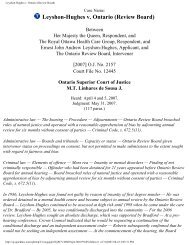
![LaFortune [LaFortunate] (Re) - British Columbia Review Board](https://img.yumpu.com/42779845/1/190x245/lafortune-lafortunate-re-british-columbia-review-board.jpg?quality=85)
